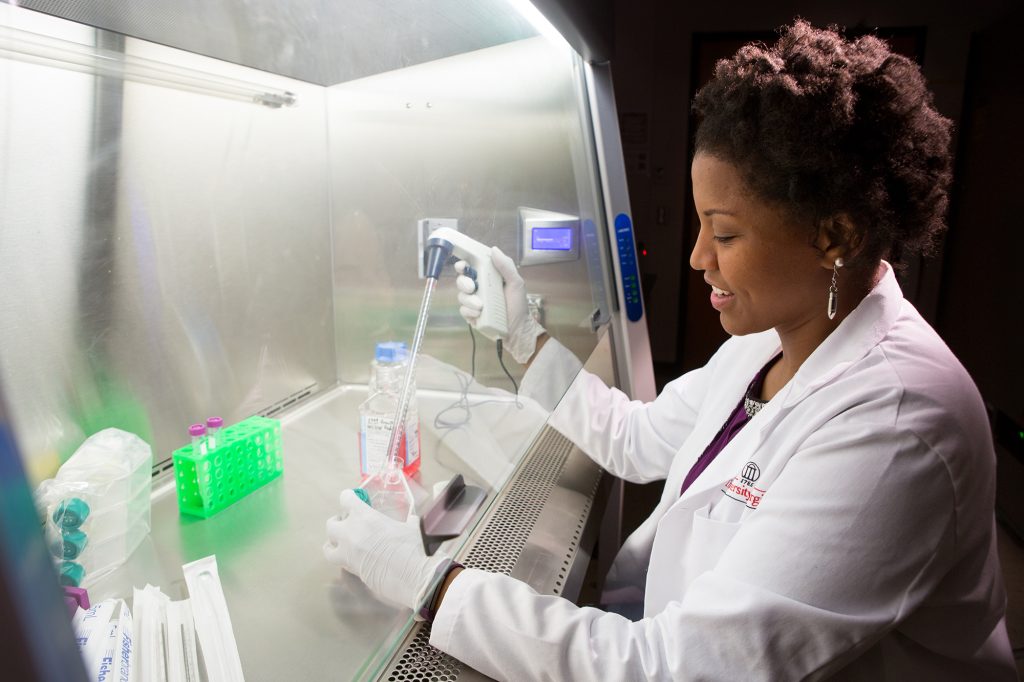When Science Becomes Personal: UGA Researcher and Geneticist Joins Breast Cancer Initiative
By: Cynthia Adams | Photos By: Nancy Evelyn
In pursuit of a UGA doctorate in genetics, Brittany Jenkins has a close up view on breast cancer. The award-winning doctoral researcher is concerned with a particularly vulnerable population: those of African descent.
This year, Jenkins won a Gilliam Fellowship for Advanced Study from the Howard Hughes Medical Institute—the first UGA student to do so. “The institute is quite a big name,” she says. “The focus is to promote minority students and train the next generation of minority researchers.”
The Howard Hughes Medical Institute selected 39 new Gilliam fellows, calling them “exceptional doctoral students who have the potential to be leaders in their fields and the desire to advance diversity and inclusion in the sciences.”
Jenkins’ advisor and principal investigator is adjunct genetics faculty member Melissa B. Davis, who nominated Jenkins for the HHMI fellowship.
This year, Davis moved her research team to the Henry Ford Hospital System in Detroit, Mich., where the team would gain greater access to a diversity of research subjects and interaction with top breast cancer researchers. Jenkins had just settled into their new facilities this summer, where UGA researchers are closely aligned with the Detroit hospital system.
“One of the reasons we moved to Detroit is that this population will be a lot more diverse,” she explained. “We are limited in our database; databases we have access to are heavily European. One thing we have tried to do here is develop our own repository of samples.”
The group works with Dr. Lisa Newman, an oncological surgeon who joined Henry Ford in 2015. Newman performs breast cancer surgeries and oversees weekly multidisciplinary breast cancer conferences and clinics as director of the Breast Cancer Global Health Research Program, and is the founding medical director of the International Center for the Study of Breast Cancer Subtypes.
According to a release from Henry Ford, “Leading the new international program will allow Dr. Newman to continue and grow her research on ethnicity-related variation in breast cancer, including triple negative breast cancer, an aggressive form of the disease that disproportionately affects African American women and young patients.”
As a high-profile medical spokeswoman, Newman has been featured on national television media on programs such as “Good Morning America.”
“Within genetics, we were the only ones working on breast cancer, or cancer period,” Brittany Jenkins says. Now working with the Henry Ford Health System, the UGA research team widely expands their available research materials and patient access.
Understanding Breast Cancer
As Jenkins explains, for half a century breast cancer (BrCa) has been the single most prevalent cancer in women worldwide. The disease disproportionately affects many populations, with a higher prevalence seen in populations of European decent. But those of African descent are affected by a more aggressive disease type.
Can UGA researchers like the Davis group shed a light on why?
Jenkins’ team investigates the genetic causes of “health disparities seen between populations, specifically addressing the tumor environment of several subtypes of BrCa, including those tumors that are positive for estrogen receptors (ER+), and those that are negative for all hormone receptors (triple negative). Since chemotherapy often targets hormone receptors, triple negative tumors are considered particularly aggressive, often responding poorly to conventional treatments,” she explains. Worse, these aggressive tumors are more often found in women of African descent.
Medical research points to a factor which potentially explains differences in the body’s natural ability to fight disease. That factor is the role played by the human immune system.
“Immune cells play an active role in fighting cancer cells and other diseased cells within our body,” explains Jenkins. “The recruitment of immune cells depends on small molecules called chemokines, whose migration can vary depending on the characteristics of the tumor.”
Jenkins’ work focuses upon a chemokine receptor. Based upon individual genetic ancestry, this receptor is expressed on some tumor cells but not others. A specific receptor can also influence whether or not immune cells will migrate to a tumor. “It is my goal to investigate the functional and genetic basis of this receptor, as well as uncovering more information about the chemokine and immune cell regulation that this receptor influences in the context of BrCa.”
Brittany Jenkins says she is engrossed by the research challenge of cancer, comparing it to a mythical greek hydra. “It is like a monster with many heads,” she admits. “We’re learning something different everyday…how cancer moves and progresses.”
Heritability and Genetic Mutation
During a break from her experiment, Jenkins reported that she is happily adapting to her new work environs. She answered questions about the team’s research and how its game-changing potential. She began by discussing heritability.
In the newfound era of genetic editing, the public is interested in how cancers develop and cancer-causing genetic mutations might be repressed or eliminated altogether. Jenkins described why a chemokine receptor is important to understanding new treatment modalities.
“The main thing my lab focuses on is looking at genetic mutations that drive cancer progression and one gene, a chemokine. Chemokines are really small and signal to cells. Most chemokines will tell cells to move in certain directions. For example, if you are cut, chemokines direct the movement of your immune cells to that area.”
One receptor is unique, Jenkins says, because it does not signal to other cells, but still binds chemokines. (As the research is proprietary she is not free to reveal specifics.) “If the chemokine level gets too high in the body, this increases overall inflammation, which is a bad thing, especially for cancer. Our chemokine receptor helps to control these levels.”
Jenkins adds that the mutant gene that controls the receptor is found in “almost 100 percent of West African and in 80 percent of African Americans.”
Further, “when you have this mutation, the receptor is not expressed in red blood cells throughout your circulation. If you don’t have this receptor, you will likely have a higher level of inflammation, and more progressive inflammation-related diseases, such as cancer.”
Is this a breakthrough for breast cancer? At the very least, Jenkins says it is significant.
“There are still a lot of questions that need to be answered for cancer in general. All are really hard to pinpoint, using one mechanism or technique. We are making progress, though.”
Could it be that CRISPR, the new gene editing discovery, is a revolutionary answer? Jenkins speculates. “CRISPR is a way to go in and edit any gene we want to edit. It will allow us to change a mutated version of that gene to one that isn’t, which could be potentially revolutionary for many diseases, including cancer.”
Jenkins compares the study of cancer to a mythological Hydra. “It is like a monster with many heads,” she observes. “We’re learning something different everyday…how cancer moves and progresses.”
Is challenge why she chose genetics? “It wasn’t something I had planned. It was something I fell into,” she explains. “Previously I was working in pharmaceutical science and looking at the structure of certain proteins.” She rotated with her principal investigator, Melissa Davis.
The researchers forged an immediate bond. “I loved her mentorship style, and work with African Americans. It was so impactful and relevant to my life.”
A family issue drew Jenkins further into breast cancer research. Ten years earlier, “a loved one discovered they had cancer.” In 2007, Jenkins’ mother was diagnosed with uterine cancer during Jenkins sophomore year at Clemson University. Her father attempted to shield his young daughter from the most difficult truths, but she knew enough already to feel deeply worried by the possible outcomes.
Her mother’s uncertain future also meant her own future was in question. “I didn’t know if I was going to grad school, or where. It had such a large impact on my family”
Yet Jenkins managed to not only continue her studies but to excel in them. She obtained a master’s in biotechnology in 2014 from Claflin University in Orangeburg, S.C. before continuing her studies at UGA in genetics. Now there were direct family ties that were binding her ever more closely to understanding cancer.
Winning the Gilliam fellowship from the Howard Hughes Medical Institute
The HHMI fellowship monies enabled Jenkins to continue her work, benefiting both her work and future.
“The Institute is about as big as Johns Hopkins or Harvard Medical,” she shares.
While she is the only African American currently working on a doctorate in genetics at UGA, she is not the first. “I’ve always been one of few African Americans in my STEM classes,” Jenkins adds. “It was always that I was the only one who looked like me.”
A path-blazing role in STEM is not new to her. “In high school, I went to a school that was mostly Caucasians,” says Jenkins. Nonetheless, she joined the international baccalaureate program, and the honor students took all their classes together. She was the only person of color in that class.
When Jenkins was admitted to Clemson University, she found she once again represented a small sector of her entering genetics class. “I was in a small group—three out of 80 who were people of color. Then, I came to UGA and I am the only one within the genetics department.”
She is aware that this poses another requirement of her. “It’s so important to know someone like you did it,” Jenkins stresses.
“I was actually reading about the statistics at UGA. Where are incoming students coming from? Few are actually coming from Athens. Some live in Athens yet have never set foot on UGA’s campus! I think that’s something that needs to change immediately.”

By studying receptors, Jenkins better understands how an individual’s genetics express their ability to fight cancer. Through her UGA work with GRADS, she hoped to provide unique professional development opportunities for all STEM graduate students, and build a sense of community for students from underrepresented groups.
Jenkins worked with GRADS, a student group on campus. “I’m proud to be one of the founders and the first president of the organization.” GRADS, or Graduate Research Assistants Diversifying Stem, is a “reboot of a previous organization called SD squared.”
Jenkins was inspired to be instrumental in that reboot, “taking part of the old organization and revitalizing it to benefit minority graduate students at UGA today.”
Although she genuinely likes Detroit, she says it is nothing like Athens. “I’ll get the culture shock in the winter time,” she jokes, when the winter snows pile high. Yet she revels in the large network available to researchers there, where she will remain until completing her doctorate in 2019.
Jenkins worked with GRADS, a student group on campus. “I’m proud to be one of the founders and the first president of the organization.” GRADS, or Graduate Research Assistants Diversifying STEM, is a “reboot of a previous organization called SD squared.”










